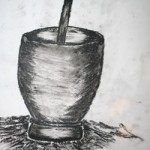All are part of the human family.
Before we are Mexican, American, Ugandan, Chinese, Italian, etc., we are kin.
Universal Declaration of Human Rights
Preamble. “Whereas recognition of the inherent dignity and of the equal and inalienable rights of all members of the human family is the foundation of freedom, justice and peace in the world…”
Article 1. “All human beings are born free and equal in dignity and rights. They are endowed with reason and conscience and should act towards one another in a spirit of brotherhood…”
Not All Animal
 “Man, though an animal, is not all animal. He is rational, and he cannot live by animal gratifications alone; still less by amusements that animals have too much sense to indulge in. A man must use his mind; he must feel that he is doing something that will develop his highest powers and contribute to the development of his fellow man, or he will cease to be a man.”[1]
“Man, though an animal, is not all animal. He is rational, and he cannot live by animal gratifications alone; still less by amusements that animals have too much sense to indulge in. A man must use his mind; he must feel that he is doing something that will develop his highest powers and contribute to the development of his fellow man, or he will cease to be a man.”[1]
Ubuntu
“A person is a person through other people…No one comes into the world fully formed….We need other human beings in order to be human. The solitary, isolated human is a contradiction in terms…. All humanity is interlinked. Thus, the humanity of the perpetrators of apartheid was inexorably bound to that of their victims. When they dehumanized another by inflicting suffering and harm, they dehumanized themselves.”[2]
The Beginnings of Advocacy
 We disservice those for whom we advocate if they are “the needy.” We disservice them if they are approached with a remote studious posture and the intention of understanding cultural nuances, differences, or the manner in which we can help. We disservice them if they are anything but an extension of our family. Before we were many tribes, nations, and shades, we were one tribe. Despite our divisive stabs at self-sanctification, we, the human family, are of common stock and ancestry. All subjected to atrophy, we must recognize our individual and corporate frailty, the fact that we are all love-hungry children longing for transcendence, affirmation, and the warmth of our fellow man. We are all in need. We are all deprived and lacking in certain ways. To approach “them,” we must do so in a spirit of commonalities before differences, understanding the reciprocal blessing and wisdom of walking together in a spirit of solidarity.
We disservice those for whom we advocate if they are “the needy.” We disservice them if they are approached with a remote studious posture and the intention of understanding cultural nuances, differences, or the manner in which we can help. We disservice them if they are anything but an extension of our family. Before we were many tribes, nations, and shades, we were one tribe. Despite our divisive stabs at self-sanctification, we, the human family, are of common stock and ancestry. All subjected to atrophy, we must recognize our individual and corporate frailty, the fact that we are all love-hungry children longing for transcendence, affirmation, and the warmth of our fellow man. We are all in need. We are all deprived and lacking in certain ways. To approach “them,” we must do so in a spirit of commonalities before differences, understanding the reciprocal blessing and wisdom of walking together in a spirit of solidarity.
On Pity
 Deep within the unexamined heart resides a reservoir of pity. This might have an element of classical pity as defined by Webster, “a sympathetic or unkindly sorrow evoked by the suffering, distress, or misfortune of another,” however, it is often marked by the notion that another is, because of their supposed needy state, pathetic. Unconsciously absorbed from consumer culture, this materialist-pity sears the conscious, brings an air of superiority, and encroaches upon human dignity.
Deep within the unexamined heart resides a reservoir of pity. This might have an element of classical pity as defined by Webster, “a sympathetic or unkindly sorrow evoked by the suffering, distress, or misfortune of another,” however, it is often marked by the notion that another is, because of their supposed needy state, pathetic. Unconsciously absorbed from consumer culture, this materialist-pity sears the conscious, brings an air of superiority, and encroaches upon human dignity.
The media, the loudest voice of supposed reason, encourages the backwards ethic of power and beauty as king and queen. Royal power, in this ethic, pivots on personal autonomy and one’s ability to remain unscathed from an ever-offensive position of need. While unlivable and contradictory, this “comfort”, “protection from pain,” and “social position” is what many seek. Sadly, it will never comfort, protect, correct, or satisfy.
Can I change the world?
As you read this you are changing the environment around you. Your body is giving off heat, energy, hormones, and chemicals that are changing your local environment. The change you impart, like it or not, continues to impact the greater surroundings. Regardless of whether or not you are conscious of it or proactive, you are and will continue to change the world. How will you change the world? What will be your legacy? How will you use your talent and treasures?
[1] Hutchins, Robert. Great Books Of The Western World (Book 1). Encyclopedia Britannica.Chicago1989.53
[2] The Most Reverend Desmond M. Tutu, OMSG DD FKC Anglican Archbishop Emeritus of Cape Town. From The Words and Inspiration of Mother Teresa. Blue Mountain Press, Bolder Co. 3,4
